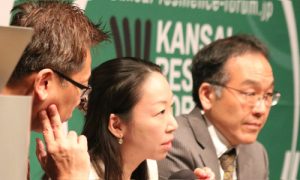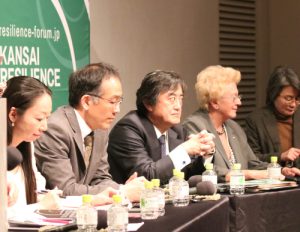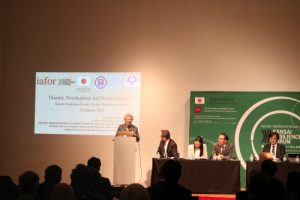Kobe, Japan – (JCN Newswire) – The Government of Japan, in collaboration with The International Academic Forum (IAFOR), held a major international forum to engage discussion on the resilience in society. Bringing together business leaders, civil society and leading scholars, The Kansai Resilience Forum provided a meeting place for thought leaders to share in ways to mitigate social and economic challenges, including disaster risk management, and enhance economic and social resilience from an interdisciplinary perspective.
The event took place in the Hyogo Prefectural Museum of Art, comprising three panel discussions with Disaster Risk Reduction Strategy, Resilience and Society, and Resilience and the Globalizing Economy as themes. The Forum culminated in a keynote presentation by world-renowned architect Tadao Ando. Ando designed the Hyogo Prefectural Museum of Art, which was completed in 2002, following the Kobe earthquake of 1995. The museum is a symbol of regeneration and renewal – a testament to the resilience of the city of Kobe.
The panel sessions started by looking into how Japan has drawn from its own experience to help other countries with similar vulnerabilities reduce the risk of natural disasters. Peng Er Lam, a political scientist from the National University of Singapore and panel moderator, pointed out that “In the event of natural disasters, Japan and Southeast Asian countries help one another and that creates resilience.”
Another key topic that was deliberated in the panel session was the challenges in coping with socio-economic shift including demographic changes and the potential impact of robots and AI on society. Panelists examined how these innovative new methods can contribute to rapid societal changes. Hidenobu Sumioka of Hitoshi Ishiguro Laboratory, ATR, Japan, explained “Robots can be a tool to connect people, and also provide solutions to current issues surrounding an aging society, such as stress and loneliness. I am certain that we will be co-living with robots in the near future.”
As the number of tourists to Japan has increased, and with the forthcoming Rugby World Cup and 2020 Olympic Games, the panel discussed the impact of disasters – and the perception of Japan’s safety. The panelists examined the impact of natural disasters in disrupting the supply chain in the globalized economy. Tasuku Kuwabara, a leader of McKinsey & Company’s Healthcare Practice in Japan and Asia, suggested that the “Speed and scale of the rapidly increasing diversity and internationalization in Japan is unique. With that in mind, further use of digital technology and adaptation of global best practices will be crucial.”
Tadao Ando brought the Forum to a close with a keynote address that emphasized the positive nexus between the arts and resilience, and the impact all stakeholders can have in enhancing social resilience in their own unique way. The Hyogo Prefectural Museum of Art, designed by Ando, was created not just as a building to replace the wreckage of the 1995 earthquake in Kobe. Ando’s goal was to help Kobe and Japan place the tragedy behind, and focus on beauty, on the future. The power of art, Ando stressed, in the face of disaster.
The participants shared the view that the concept of resilience and its applications are relevant not only to natural disasters, but also to many other social and economic challenges that the world faces today. They agreed that Japan has much to share from its own experiences in coping with traditional and emerging threats. Regardless of the prospect of future disasters, Japanese society, with strong public and private partnership supported by the active participation of all stakeholders, will continue to be at the forefront of innovation to tackle forces of nature.
Forums like this are just one way that Japan can collaborate with global thought leaders and experts to discuss and share the latest ideas and technologies for overcoming such difficulties. Disaster risk reduction and the nurturing of resilience is contextualised as part of a wider global human security concern.
Additional supporters of The Kansai Resilience Forum included the Osaka School of International Public Policy (OSIPP), Osaka University, Kobe University, and the Hyogo Prefectural Museum of Art.
For further information and speakers notes, please visit https://kansai-resilience-forum.jp.



